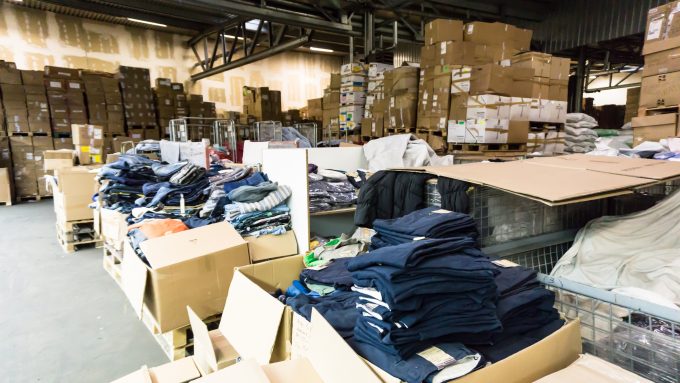Bangladesh looks at demurrage waiver as containers pile up in Chittagong
The Chittagong port yards now have close to 40,000 teu of containers, mainly loaded with ...
TFII: SOLID AS USUALMAERSK: WEAKENINGF: FALLING OFF A CLIFFAAPL: 'BOTTLENECK IN MAINLAND CHINA'AAPL: CHINA TRENDSDHL: GROWTH CAPEXR: ANOTHER SOLID DELIVERYMFT: HERE COMES THE FALLDSV: LOOK AT SCHENKER PERFORMANCEUPS: A WAVE OF DOWNGRADES DSV: BARGAIN BINKNX: EARNINGS OUTODFL: RISING AND FALLING AND THEN RISING
TFII: SOLID AS USUALMAERSK: WEAKENINGF: FALLING OFF A CLIFFAAPL: 'BOTTLENECK IN MAINLAND CHINA'AAPL: CHINA TRENDSDHL: GROWTH CAPEXR: ANOTHER SOLID DELIVERYMFT: HERE COMES THE FALLDSV: LOOK AT SCHENKER PERFORMANCEUPS: A WAVE OF DOWNGRADES DSV: BARGAIN BINKNX: EARNINGS OUTODFL: RISING AND FALLING AND THEN RISING

Air freight rates are soaring out of Asia to Europe and the US west coast, with Bangladesh to Europe seeing particularly high demand, forwarders have told The Loadstar.
Tight capacity, plus shippers looking to meet end-of-quarter numbers, are said to be behind the market growth.
The ready-made garment sector has increased demand, with Inditex alone thought to be moving between 300 and 500 tonnes a week out of Bangladesh, mostly on charters, but also looking for excess capacity on scheduled carriers.
The rise, coupled with higher volumes out of India, is leading to delays in Dhaka, and congestion in the Gulf hubs, according to local sources.
Transit times out of Dhaka have gone up by two to three days as freight waits two days to board aircraft.
One local forwarder told customers: “Air volumes out of Bangladesh have witnessed a sharp increase during the past week. Almost all flights are moving at full capacity from Dhaka. An increase in Far Eastern and Indian markets too have contributed significantly to this situation.
“All carriers have increased their rates during the past week due to high demand, and it is anticipated it can further increase.”
Another local forwarder told customers: “We foresee a bit of a congestion for air freight shipments in the coming weeks, especially out of transit points such as Doha, Abu Dhabi and Dubai, due to an increase of volumes out of India.
“We suggest you check rates on a case-by-case basis, to avoid any confusion.”
The market out of Bangladesh to both Europe and the US surged at the start of March. Airlines are said to have increased rates by 5-8%, discontinued spot rates and set a four-to-five day advance booking requirement.
Another forwarder told The Loadstar this morning: “The market is buoyant all round.”
Congestion in the Gulf is said to be causing delays for exports across Asia. One forwarding report notes that carriers have stopped quoting spot rates out of Thailand, while there is insufficient capacity out of Vietnam.
Airlines are said to have been offloading freight out of Ho Chi Minh and Hanoi, while rates have increased 60% out of the country since the end of January.
Meanwhile, forwarders are reporting backlogs out of Shanghai to the US west coast, following the cancellation of a number of Chinese freighter flights, sending rates up about 17% to the US and 5% to Europe.
The rush to meet quarter-end deadlines, plus re-routed freight from north China to the south in search of capacity has compounded the problem and added to strong demand out of Shenzen and Guangzhou, with rates up between 15% and 30% last week.
Two to three days advance booking is required and transit times have extended. Air freight rates out of Hong Kong rates have risen about 10%, while Taiwan is thought to have a backlog of about 130 tons of air freight.
“These market conditions are expected to persist through the end of March,” notes the report.
Tight capacity eastbound, out of Europe to Asia, on ocean freight has also added to premiums on air.
One forwarder told The Loadstar: “It’s all looking quite upbeat and healthy really, whether its surface freight or air freight. Congestion equals dollars!”
Bangladeshi exporters say the situation has been exacerbated by the continued ban by the UK and Germany on direct flights from Dhaka.
Implemented last year over security concerns, it means that all freight must be re-screened at a third country before arriving in the UK or Germany, a process which adds a day or two to transit times.
Last year, Germany imported nearly 30,000 tonnes of air freight from Bangladesh, while the UK imported just under half that amount.
Comment on this article
Mark Hawkins
March 22, 2017 at 4:13 amTraditional peak out of ISC for fashion retailers Spring/Summer ranges is nothing new, but Air carriers continue to experience exceptional demand for capacity in Q1.
Sea-Air continues be a viable alternative for less time critical orders, and avoids congested Middle East hubs, who are handling strong volumes to China due to Ocean export congestion.
Najma Qureshi
May 07, 2018 at 7:18 amAir freight expenses are going soar not only on from Asia to Europe but all across the world. Having to face such kind of expenses will lead to a faster mode of communication.